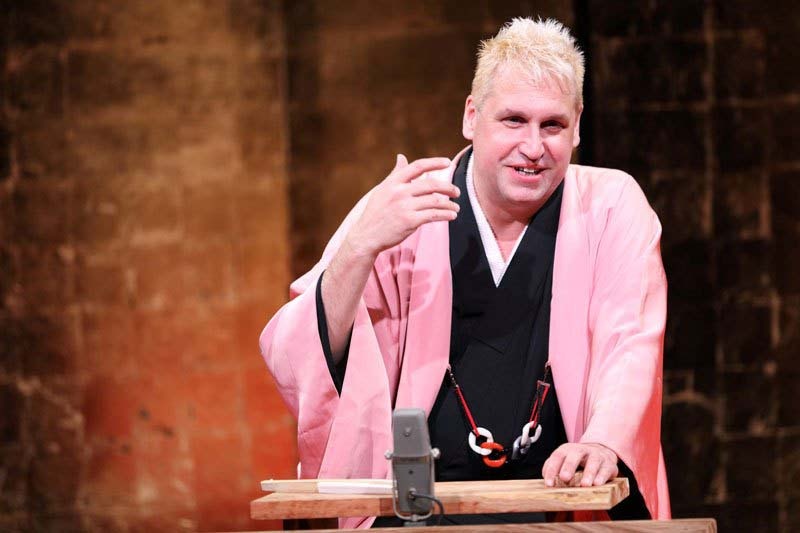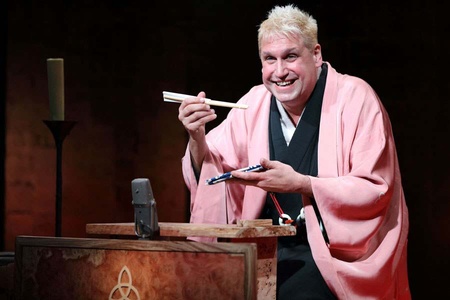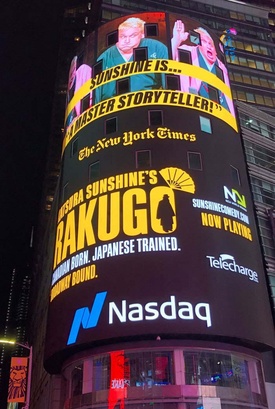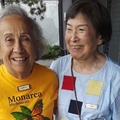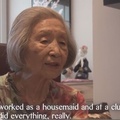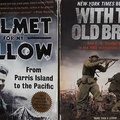Washin Kai and Town Hall Seattle welcome renowned entertainer Katsura Sunshine for a special performance of unique storytelling called rakugo. Rakugo (from the kanji for Kyoto, the capital, + speech, language) is a 400-year-old tradition of comic storytelling in Japan.
Katsura Sunshine starred in the NHK World TV series Dive into Ukiyo-e, emceed the opening reception for the G20 Summit in Osaka in 2019, and has performed in an extended run of shows Off-Broadway. This special, English-language performance will be broadcast live from Tokyo.
Sunshine will perform one traditional rakugo story and another written by his master. That is how he typically opens his Broadway show.
Join us for this introduction to rakugo and a singular performance from Sunshine as he works to share this traditional art with the world.
Katsura Sunshine was born in Toronto, Canada, and began in entertainment as a playwright, composer, and producer of musical theatre. In 2008, he became the 15th apprentice to the great Rakugo Master Katsura Bunshi VI, from whom he received the name Katsura Sunshine. He is only the second westerner to make a go at the traditional art-form across Japan’s 150 years of renewed contact with the West since 1868. Few have attempted owing to the language, cultural, and personality hurdles involved. It is simply hard to understand and tell jokes in a second language because doing so commonly also requires an in-depth knowledge of the second country’s culture. Moreover, to pull it off successfully, one needs to have the charm, quick wit, and timing of a stand-up comedian. One must be able to tell a funny story and get others to laugh.
Town Hall is a performance hall and cultural center on the east side of Seattle’s downtown, at Eighth and Seneca. Normally an active event venue, all of its activities are presently online owing to COVID-19.
Washin Kai is a voluntary community group that supports the teaching of classical (pre-Meiji) Japanese literature at UW—through funding a graduate fellowship—and in Puget Sound, by supporting related cultural events. At UW, the teaching of this rich literature is underfunded. Only one class, “Classical Japanese Literature,” is being taught on it in the Department of Asian Languages and Literature, despite the thousand-year-plus period the literature spans.
On September 16, the North American Post interviewed Katsura Sunshine by email, as excerpted below.
* * * * *
As a student of “Things Japanese,” it seems to me that there are various cultural boundaries that Americans and Japanese do not want to cross. For example, among foods, there is the “natto” [fermented beans] line between residents of western and eastern Japan. This line also extends to Americans, as some things are just “too Japanese.” The same might be said for spoken-word-based arts such as Rakugo. Do you think you are successfully coaxing Americans across this line?
The Natto line is definitely a fuzzy one as quite a few of my friends from Osaka love it!
I find American audiences to be truly and deeply interested in things Japanese: Japanese cuisine, Manga, Anime, Kabuki, Noh, Ukiyo-e, Japanese film, Kimono, Judo, Karate, sword-making… Actually, I have never heard an American complain that something is “Too Japanese.” Quite the opposite, for Americans I have met, the more Japanese the better. This holds true for New York and holds true particularly for Seattle where I have performed several times.
So, I don’t feel like I am coaxing anyone at all. However, to your point, Rakugo is a spoken art which is not accessible if it is not done in a language you understand. I am happy to play a small role in bringing this wonderful and truly entertaining 400-year-old comic storytelling tradition to the English and French speaking worlds.
The New York theater critics seem to like your one-person act, which says a lot. Yet if you had to put numbers on it, what percentage of what you do is actual traditional rakugo storytelling, and what percentage is “telling funny gaijin stories” of your experiences across two decades of life as a blonde westerner in Japan?
One Rakugo performance or “set” consists of a comic monologue followed by a traditional story told in a conversational style. The traditional stories are passed down from master to apprentice, and all storytellers share the same body of stories, much like Jazz musicians draw from the catalogue of standards.
The comic monologue consists mainly of the individual storytellers’ own “material:” anecdotes, personal stories, observational humor, jokes, etc. The theme of this monologue slowly molds into the theme of the upcoming traditional story—so that Rakugo audiences often enjoy trying to guess which story is coming from the theme of the monologue—and are often able to do so!
So, as a percentage, except for the fact that I have translated the performance into English, I would say what I am doing is 100% actual traditional Rakugo storytelling, and would not differ in form from the performance you would get in Japanese from any of the 800 or so Japanese professional storytellers.
(By the way, I am not naturally blond. I dyed my hair at the behest of my Rakugo Master who thought blond hair would suit the name Sunshine which he gave me!)
In reading about your background online, I note that you studied Greek Classics at the University of Toronto, and later performed Aristophanes—known as the “father of comedy”—for 15 months in Toronto before later bringing it on tour. Does this background in studying and performing low-tech, Old-World spoken-word acts help you today?
Yes. The one thing that struck me when I first experienced Rakugo, and fell in love at first sight, is that everything I had been interested in and studied up to now was wrapped up in this minimalist comic art form: old and traditional themes, theater, comedy, storytelling, traditional culture.
Do you perform in Japanese as well?
Yes!
How’s business for you these days? For example, you were running a show Off-Broadway in New York until its last performance on March 12, 2020. Is your work picking up again?
Right now, I am concentrating on bringing Rakugo to the world online through YouTube etc. and hope to turn Rakugo into a Netflix comedy special soon. (We were actually booked to record in Toronto in May which has also been postponed due to COVID-19).
I am preparing a podcast for Spotify and writing a book about Rakugo. I am studying Chinese and hope to perform Rakugo in Chinese by the end of the year. I am also releasing an original denim kimono fashion line using 100% Okayama denim.
Also, three of my kimonos are still in the dressing room at New World Stages so once Broadway re-opens I will be ready to resume!
Besides your one-day show through Seattle’s Town Hall, do you have other online events scheduled that Seattle- and other US-based viewers can watch for?
I would love to invite viewers to see my YouTube Channels where I am producing short Rakugo videos and other content on related Japanese themes! English: Katsura Sunshine Rakugo Channel
Is there anything else that you want to convey to Seattle readers?
Seattle was the first stop on my North American Tour in 2013, and the audiences were absolutely awesome. I have been looking forward to this performance for over a year since we started planning it, and am really disappointed not to be going to the Town Hall in person. So please accept this online taste of Rakugo as a preview of the live show we will do once this craziness subsides!
* * * * *
Katsura Sunshine (livestream) Rakugo Storytelling
Date: Tuesday, October 20th
Time: 7:00 p.m.
Admission: Free and open to the public
Registration: https://townhallseattle.org/event/katsura-sunshine-livestream/
Co-sponsor: Washin Kai – Friends of Classical Japanese, Department of Asian Languages and Literature, University of Washington.
* This article was originally published in the North American Post on October 9, 2020.
© 2020 David Yamaguchi / The North American Post


